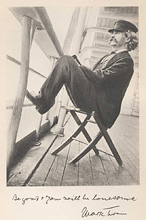Recent Read – “Following the Equator” by Mark Twain

Author: Mark Twain
Publisher: Available for download from Project Gutenberg
Following the equator is a journal of Mark Twain’s travel across the world on a lecture tour. While we call today as the days of the world travel, Twain was a good hundred years ahead, embarking on such a journey in the last years of 19th century. My own reading of the book is limited to the chapters on India, which runs for nearly 200 pages.
Twain arrives in Mumbai, and travels to many places that include Calcutta, Allahabad, Lucknow, Varanasi and Jaipur. They stand as a tourist’s choice of destination even today. While the book is written more like a personal journal, Twain uses every chance to deviate from his explorations to add stories from history of India, related incidences from his own past, and never misses a chance to pass a sarcastic commentary on everything he observes. A paragraph on the numerous crows that he encounters on the Balcony of the hotel window gives a perspective of Twain’s sarcasm.
They were very sociable when there was anything to eat—oppressively so. With a little encouragement they would come in and light on the table and help me eat my breakfast; and once when I was in the other room and they found themselves alone, they carried off everything they could lift; and they were particular to choose things which they could make no use of after they got them. In India their number is beyond estimate, and their noise is in proportion.
But it is not just humour that touches the reader. He digs deeper into government gazettes and documentary evidences on Thugs – the murderous dacoit clan that once stole from travellers from all over India. His visit to Varanasi includes extensive quotes from credible sources on the ways of Indian pilgrims, but quickly backed up with humorous notes on a suggested itinerary for the pilgrim. He frequently shifts between personal and neutral observations, sarcasm, history and events from his life as the pages progress. Interestingly, despite all the sarcasm that is packed in the book, he is never demeaning the local way of life and the native people, and often comes out as a kind person who sympathized with the subjects of the book.
Because it is written like a diary, occasional digressions may disturb the reader from a smooth flow in many occasions. But the humourous take that he always comes up with, makes up for the digressions. For the Indian reader, ‘Following the Equator’ can be more than a travelogue – it comes with some learnings on the history and gives a perspective of everyday life in India a hundres years ago, besides entertaining thoroughly through the pages.
